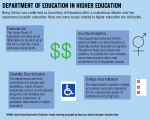Some UCLA students and faculty said they are concerned about the new Secretary of Education’s past policy positions.
The U.S. Senate narrowly confirmed Betsy DeVos, a businesswoman and charter school advocate, Feb. 7. Some educators and public school students questioned DeVos’ qualifications and whether she could work to improve all forms of education given her previous advocacy for private schools.
“’If public schools are not at the level (the government) thinks we should be, we should privatize them’ – this is wrong,” said Tyrone Howard, professor of education at UCLA. “Public schools are supposed to be for the public good.”
Howard said he disagrees with DeVos’ past work to provide charter and private schools with public funding.
“The minute we move towards privatization of education, students getting left behind becomes an issue,” added Howard. “This undermines what our democracy is all about. Privatizing education is a threat to democracy.”
Howard also said he wants to hear more about DeVos’ experiences working, learning and engaging parents in public schools.
During her time as a Republican Party chairwoman in Michigan, DeVos was an advocate for privatization of public schooling. DeVos tried to pass policies that would direct federal funding to private education. She also served as chairwoman of American Federation for Children, which advocated for privatization of education and school vouchers, according to the Washington Post.
Howard also said he is troubled by DeVos’ with the the debate between growth and proficiency when measuring student performance.
Democratic Sen. Al Franken of Minnesota asked DeVos on her stance regarding the difference between proficiency and growth of students during her Senate confirmation hearing. When attempting to explain her stance, DeVos said she favored proficiency, but started to describe details associated with growth advocates.
Howard said he thinks identifying the progress of a student with growth is more important than assessing students based on an arbitrary standard of proficiency.
DeVos will also oversee the distribution of more than $150 billion in loans, grants and work-study funds. During DeVos’ Senate confirmation hearing, Democratic Sen. Elizabeth Warren of Massachusetts questioned DeVos about her experience with loans. DeVos said she had no experience in applying for or distributing multimillion dollar loans.
At UCLA, 45 percent of undergraduates do not pay tuition because of financial aid.
Sam Malekan, a third-year history student and co-director of student services for the Financial Support Commission at UCLA, said he is concerned about having a Secretary of Education who has never applied for financial support herself. He added he does not have faith in her abilities to lead a sector of government that distributes so much aid yearly because of her lack of experience.
Daniel Partiyeli, a third-year economics student, also said he thinks it is important for the leader of the Department of Education to have firsthand experience applying for federal student aid. Partiyeli said he applied for student aid at his community college and at UCLA.
He added he thinks the financial aid system should be led by someone who has experience interacting with it.
Shahdad Rahimian, a third-year economics student, said he is concerned about her flippancy toward weapons in the classroom.
When Democratic Sen. Chris Murphy of Connecticut, a vocal gun control advocate, questioned DeVos on her stance on guns in schools, DeVos said some schools need them for protection and suggested Wyoming schools may need firearms for brown bears.
Rahimian said he thinks DeVos does not understand creating safe environments for students is a nonpartisan issue.
